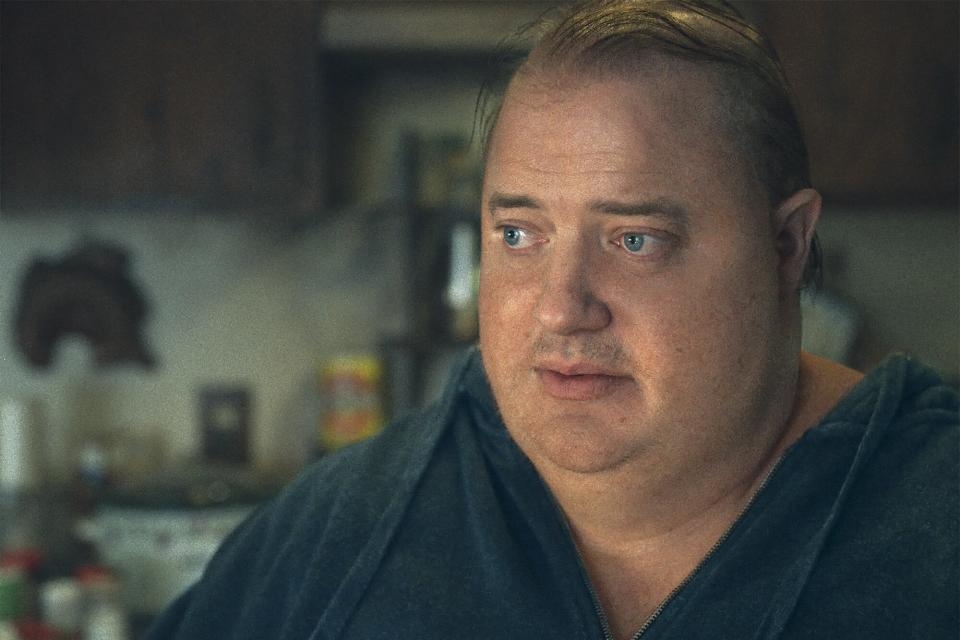The Whale review: Brendan Fraser shines in a overwrought, underbaked drama
In every awards season, there are certain movies whose heat index seems to rise almost solely because of a central performance: actors so indelible in the part they transcend the flaws and missteps of the film formed around them. (Renée Zellweger in Judy was one a few years ago, or Rami Malek in Bohemian Rhapsody; both won Oscars.) Brendan Fraser's astonishing turn in The Whale often feels like that to the nth degree: a tender, modest, and momentously human piece of work plonked in the midst of a drama so masochistically stilted and stagey it often feels less like a movie than an endurance test, or even worse, a parody.
The staginess, to be fair, is at least partly because it was in fact a play, one that director Darren Aronofsky spent the last decade trying to bring to the screen (the playwright, Samuel D. Hunter, also penned the adaptation). Why the man who helmed Black Swan, The Wrestler, and Requiem for a Dream would find a bleak psychological drama about deeply broken people appealing is not a mystery; what he found irresistible here though, is less easy to see. Fraser's Charlie, in the opening scene, is just a voice inside a black Zoom screen. That's because he teaches remotely at an online college, but his excuse of a broken laptop camera is a lie: The truth is he's morbidly obese, so large that he can't leave his shabby apartment or even stand up without a walker. He can just about manage to bathe and feed himself, but other activities (masturbation, laughing) leave him too clammy and winded to breathe.

A24 Brendan Fraser in 'The Whale.'
There's a gadget for nearly every physical thing he can't do on his own — handles and pulleys in the shower, a special seat in the bathroom, even a little clawed picker-upper for whatever he might drop on the floor. And a friend named Liz (Watchmen's Hong Chau) comes faithfully every day to check his vitals and bring him groceries. Liz is also a nurse, and she keeps telling him plainly that he's dying. But she's often interrupted by a knock at the door: First an earnest young missionary (Ty Simpkins) named Thomas hoping to spread the good word, and later, Ellie (Stranger Things' Sadie Sink), his estranged teenage daughter whose only words for him, primarily, are sneered f-bombs. Ellie, hissing and venomous, hates him because he left her mother (Samantha Morton) years ago for another man, but mainly she hates everything.
Aside from a single brief flashback, the action, such as it is, is confined entirely to Charlie's drab apartment and the small roundelay of guests who steadily come through to drop chunks of story exposition or settle scores. Fraser — encased in elaborate prosthetics that Aronfosky revels in shooting like a Caravaggio, all shadows and moody, milky light — welcomes them, down to the missionary kid. Charlie knows that he's killing himself and he knows why, but there's hardly any complaint or self-pity; instead he's emotionally generous almost to a fault, a man still eager to spread his love of Walt Whitman and Moby Dick and only connect, even if his efforts are met with mockery or disgust.
He and Chau, who brings a bright acidity and affection to Liz, often seem to be drawing from a different well than their castmates. But all the actors are left to mine their own layers in characters who have only the scantest backstories and broad traits: Hellish Teenager, Troubled Soul, Man Too Big to Live. Those dynamics may have played out better on stage, where a certain kind of bold underlining serves a live audience. Here it often feels clumsy and maddeningly inconsistent, stranding Fraser in a melodrama undeserving of his lovely, unshowy performance. Whatever he wins for The Whale — and early prizes have already come — he deserves. The rest is just chum. Grade: C
Related content:
Mummy reunion! Brendan Fraser and Michelle Yeoh share a sweet hug at TIFF Tribute Awards
Brendan Fraser says he might not take another role as deep as The Whale: 'I gave it everything'
Lena Dunham took Andrew Scott from hot priest to 'hot medieval dad' in Catherine Called Birdy
Brendan Fraser gets emotional over Whale awards victory, his first trophy 'since grade 4'

